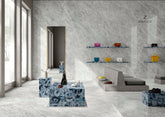Neolith vs Dekton: A Side-by-Side Comparison for High-End Surfaces
For those designing or renovating luxurious interiors and exteriors, the decision between Neolith vs Dekton can significantly shape the outcome. Both are premium sintered stone surfaces celebrated for their durability, exquisite aesthetics, and architectural versatility. Yet understanding the nuanced differences between these sophisticated materials is essential for making an informed choice for luxury kitchens, bathrooms, facades, and furniture applications.
If you're a discerning homeowner or a trade professional—architect, interior designer, builder, or general contractor—navigating this comparison will help clarify your next selection. At Zicana Boutique, we are pleased to provide this refined analysis based on material science, brand philosophy, application versatility, and design potential.
And while you're browsing your options, don't miss our Exclusive Offers Collection and get $100 off your order over $1,000 using Promo Code WELCOME100.
What Are Neolith and Dekton?
Neolith and Dekton are both sintered stone materials, produced through a process involving extreme heat and pressure to replicate natural stone formation. The result is a non-porous, ultra-compact surface known for superior performance in both indoor and outdoor environments.
- Neolith is produced by TheSize Surfaces in Spain and is a pioneer in the sintered stone market. Its surfaces emulate natural marble, concrete, wood, and metal finishes with stunning precision.
- Dekton is engineered by Cosentino and combines more than 20 minerals with proprietary Sinterized Particle Technology. Dekton offers an expansive palette of textures including industrial, matte, and glossy finishes.
Both materials are part of the larger trend toward sintered stone, a favorite among high-traffic residential and commercial environments due to its low maintenance and environmental performance.
Material Composition and Superiority
Both Neolith and Dekton consist of quartz, feldspar, silica, and natural oxides compacted using high pressure and temperatures exceeding 2,000°F. However, their proprietary formulas and production technologies lead to some performance differences.
- Neolith uses NeolEon® technology for enhanced sustainability and UV resistance, making it a top choice for exterior cladding and facades.
- Dekton offers HydroLock and X-Gloss technologies that enhance water-tightness and polished brilliance, perfect for kitchen countertops and luxury bathrooms.
This contrast makes choosing between Neolith vs Dekton dependent on application. For outdoor use, many experts lean toward Neolith for its blend of beauty and extreme weather resistance. Indoors, Dekton's thermal shock resistance and stain-proof capabilities make it a top choice for busy gourmet kitchens.
Design Possibilities and Texture Options
A critical component of stone selection is the final aesthetic. Both Neolith and Dekton excel at mimicking classic stones like marble and granite, yet each brand brings artistry in unique expressions.
Neolith offers hyper-realistic digital detailing that reproduces the luxury veining of Calacatta, Carrara, and other marble-inspired surfaces. In contrast, Dekton boasts collections inspired by concrete, metal, and volcanic rock—perfect for modern, industrial, or minimalist moods.
Browse Zicana’s expansive offerings including entries such as the ultramodern Porcelain Slabs Collection and our innovative Sintered Stone Slabs Collection to find the perfect aesthetic match for your project vision.
Performance and Durability Compared
In elite home and commercial spaces, strength matters just as much as appearance. Both Neolith and Dekton are engineered to outlast traditional surfaces, including granite and marble. Yet there are key differences in performance depending on application:
- Scratch Resistance: Both rate extremely high, ideal for heavy-duty use like kitchen prep surfaces.
- Heat Tolerance: Dekton edges out slightly with its ability to withstand direct hot pots and pans without scarring.
- UV Resistance: Neolith is commonly chosen for its unrivaled UV protection, making it the better choice for outdoor kitchens and pool areas.
- Stain Resistance: Both are non-porous, although Neolith may require slightly more care with certain natural pigment stains like wine or berry juices due to lighter finishes.
Also consider edge profiling and thickness availability. Both brands offer large format slabs and thinner profiles for seamless installations like backsplashes and wall cladding with minimal grout lines.
Sustainability and Certifications
For eco-conscious homeowners and LEED-certified architecture projects, both Neolith and Dekton deliver strong green credentials. Neolith is produced with 100% natural raw materials and up to 98% recycled content in some finishes. Dekton is likewise produced using renewable energy and offers EPD, Greenguard, and Cradle to Cradle certification.
In an era where sustainability aligns with luxury, Zicana proudly supports choices that protect the planet without compromising design excellence.
Cost and Value Considerations
Price points between Neolith vs Dekton tend to be similar but can vary based on installation complexity, thickness, finish, and edge profiles. Generally speaking, you can expect to pay $60–$100+ per square foot for either material installed. Slabs that emulate exotic marble or offer advanced finishes (like polished or textured) may come at a premium.
To extend luxury without exceeding budget, Zicana Boutique invites you to explore our Exclusive Offers Collection. Plus, Use Promo Code WELCOME100 for $100 off any order over $1,000. Discover the premier options in ultra-compact surfaces without compromise.
FAQs: Neolith vs Dekton Demystified
Which is better for outdoor kitchens: Neolith or Dekton?
Both offer outstanding outdoor performance, but Neolith often has the edge due to superior UV resistance and freeze-thaw durability. Its surface resists fading over time, making it ideal for patio kitchens and facades.
Can Dekton and Neolith replicate real marble?
Yes. Both brands offer collections that beautifully mimic marble’s veining and texture. Neolith excels in hyper-realistic finishes like Calacatta and Estatuario, while Dekton's Natural and Stonika collections highlight marble’s elegance with advanced gloss treatments. For genuine stone, also consider our authentic Marble Slabs Collection.
Do Neolith and Dekton require sealing?
No. Both are non-porous and do not require sealing. Their surfaces are inherently stain resistant and hygienic, making them ideal for food preparation and wet environments.
Which finish is less slippery: Neolith or Dekton?
Both offer anti-slip finishes ideal for flooring applications. Neolith’s Silk and Riverwashed finishes provide textured grip, while Dekton’s Velvet finish enhances surface traction.
Final Thoughts: Elevate with the Right Stone
Choosing between Neolith vs Dekton is less about superiority and more about selecting a surface best suited to your aesthetic and performance goals. Neolith shines in outdoor, façade, and eco-conscious projects. Dekton takes the lead in interiors where thermal shock and glossy brilliance matter.
At Zicana Boutique, we believe every space tells a story. Let us help you design yours with world-class surfacing solutions. Discover your perfect match in our Sintered Stone Slabs Collection or explore luxury materials across our catalog. Need custom dimensions? Visit our Made-to-Measure Custom Countertops page for bespoke solutions.
And before you finalize your order, gain exclusive savings by browsing the Exclusive Offers Collection and Use Promo Code WELCOME100 for $100 off any order over $1,000. Your luxury deserves nothing less.



















